Commander Synergies
Discover cards that synergize perfectly with your Commander.
Synergy
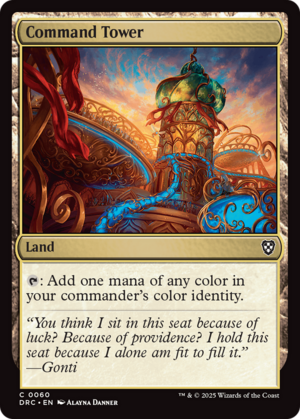
Card Details
Info
| Color: | |
| Identifies: | |
| Cost: | |
| Rarity: | Common |
| Converted Cost: | 0 |
| Power/Toughness: | / |
| Types: | |
| SubTypes: | |
| Languages: | 
          |
| Layout: | Normal |
| Rank: | |
| Saltiness: |
Rules
Text
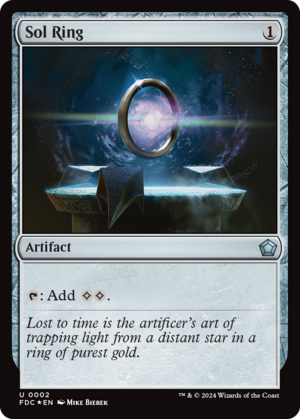
Card Details
Info
| Color: | |
| Identifies: | |
| Cost: |
|
| Rarity: | Uncommon |
| Converted Cost: | 1 |
| Power/Toughness: | / |
| Types: | |
| SubTypes: | |
| Languages: | 
         |
| Layout: | Normal |
| Rank: | |
| Saltiness: |
Rules
Text
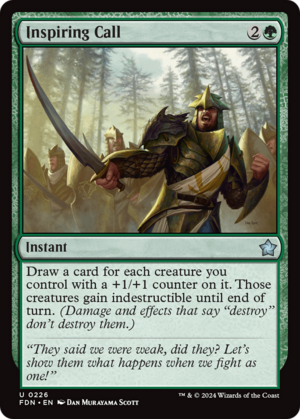
Card Details
Info
| Color: | |
| Identifies: | |
| Cost: |
|
| Rarity: | Uncommon |
| Converted Cost: | 3 |
| Power/Toughness: | / |
| Types: | |
| SubTypes: | |
| Languages: | 
          |
| Layout: | Normal |
| Rank: | |
| Saltiness: |
Rules
Prices
Legalities
Standard
Standardbrawl
Vintage
Modern
Brawl
Historic
Duel
Alchemy
Predh
Oathbreaker
Commander
Pioneer
Oldschool
Timeless
Premodern
Penny
Pauper
Gladiator
Paupercommander
Future
Legacy
Text
Draw a card for each creature you control with a +1/+1counteron it. Those creatures gain indestructible until end of turn. (Damage and effects that say "destroy" don'tdestroythem.)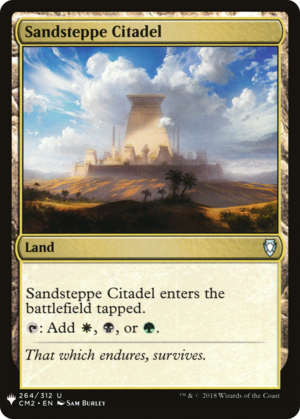
Card Details
Info
| Color: | |
| Identifies: | |
| Cost: | |
| Rarity: | Uncommon |
| Converted Cost: | 0 |
| Power/Toughness: | / |
| Types: | |
| SubTypes: | |
| Languages: | 
          |
| Layout: | Normal |
| Rank: | |
| Saltiness: |
Rules
Text
This land enters tapped.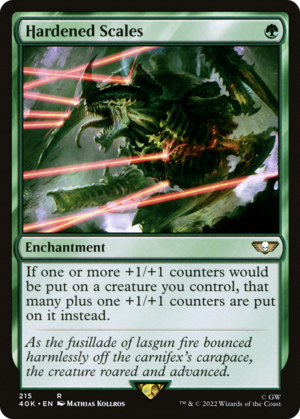
Card Details
Info
| Color: | |
| Identifies: | |
| Cost: |
|
| Rarity: | Rare |
| Converted Cost: | 1 |
| Power/Toughness: | / |
| Types: | |
| SubTypes: | |
| Languages: | 
          |
| Layout: | Normal |
| Rank: | |
| Saltiness: |
Rules
Prices
Legalities
Standard
Standardbrawl
Vintage
Modern
Brawl
Historic
Duel
Alchemy
Predh
Oathbreaker
Commander
Pioneer
Oldschool
Timeless
Premodern
Penny
Pauper
Gladiator
Paupercommander
Future
Legacy
Text
If one or more +1/+1 counters would be put on a creature you control, that many plus one +1/+1 counters are put on it instead.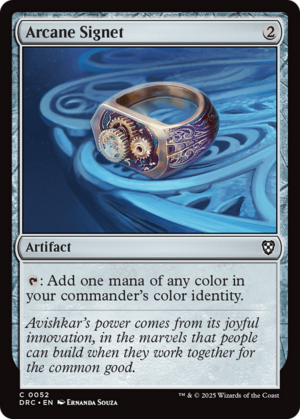
Card Details
Info
| Color: | |
| Identifies: | |
| Cost: |
|
| Rarity: | Common |
| Converted Cost: | 2 |
| Power/Toughness: | / |
| Types: | |
| SubTypes: | |
| Languages: | 
          |
| Layout: | Normal |
| Rank: | |
| Saltiness: |
Rules
Text
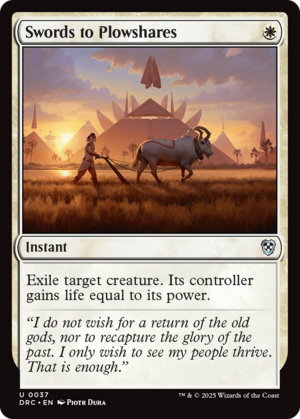
Card Details
Info
| Color: | |
| Identifies: | |
| Cost: |
|
| Rarity: | Uncommon |
| Converted Cost: | 1 |
| Power/Toughness: | / |
| Types: | |
| SubTypes: | |
| Languages: | 
         |
| Layout: | Normal |
| Rank: | |
| Saltiness: |
Rules
Prices
Legalities
Standard
Standardbrawl
Vintage
Modern
Brawl
Historic
Duel
Alchemy
Predh
Oathbreaker
Commander
Pioneer
Oldschool
Timeless
Premodern
Penny
Pauper
Gladiator
Paupercommander
Future
Legacy
Text
Exile target creature. Its controller gains life equal to its power.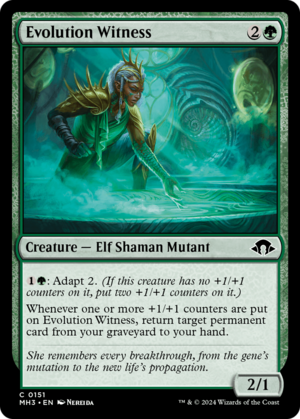
Card Details
Info
| Color: | |
| Identifies: | |
| Cost: |
|
| Rarity: | Common |
| Converted Cost: | 3 |
| Power/Toughness: | 2/1 |
| Types: | |
| SubTypes: | |
| Languages: | 
       |
| Layout: | Normal |
| Rank: | |
| Saltiness: |
Abilities/Keywords
Rules
Prices
Legalities
Standard
Standardbrawl
Vintage
Modern
Brawl
Historic
Duel
Alchemy
Predh
Oathbreaker
Commander
Pioneer
Oldschool
Timeless
Premodern
Penny
Pauper
Gladiator
Paupercommander
Future
Legacy
Text
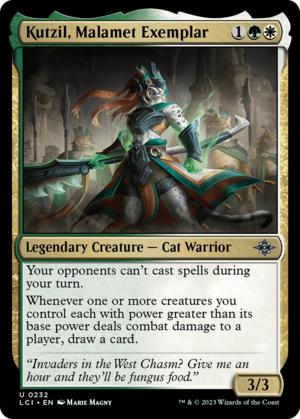
Card Details
Info
| Color: | |
| Identifies: | |
| Cost: |
|
| Rarity: | Uncommon |
| Converted Cost: | 3 |
| Power/Toughness: | 3/3 |
| Types: | |
| SubTypes: | |
| Languages: | 
       |
| Layout: | Normal |
| Rank: | |
| Saltiness: |
Rules
Prices
Legalities
Standard
Standardbrawl
Vintage
Modern
Brawl
Historic
Duel
Alchemy
Predh
Oathbreaker
Commander
Pioneer
Oldschool
Timeless
Premodern
Penny
Pauper
Gladiator
Paupercommander
Future
Legacy
Text
Your opponents can't cast spells during your turn. Whenever one or more creatures you control each with power greater than its base power deals combat damage to a player, draw a card.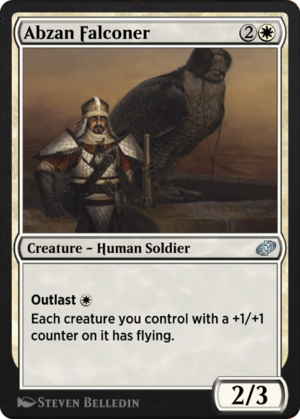
Card Details
Info
| Color: | |
| Identifies: | |
| Cost: |
|
| Rarity: | Uncommon |
| Converted Cost: | 3 |
| Power/Toughness: | 2/3 |
| Types: | |
| SubTypes: | |
| Languages: | 
          |
| Layout: | Normal |
| Rank: | |
| Saltiness: |
Abilities/Keywords
Rules
Prices
| Seller | Price |
|---|
Legalities
Standard
Standardbrawl
Vintage
Modern
Brawl
Historic
Duel
Alchemy
Predh
Oathbreaker
Commander
Pioneer
Oldschool
Timeless
Premodern
Penny
Pauper
Gladiator
Paupercommander
Future
Legacy
Text
Outlast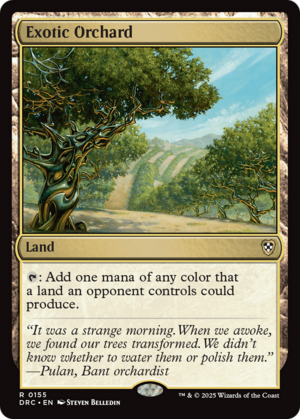
Card Details
Info
| Color: | |
| Identifies: | |
| Cost: | |
| Rarity: | Rare |
| Converted Cost: | 0 |
| Power/Toughness: | / |
| Types: | |
| SubTypes: | |
| Languages: | 
         |
| Layout: | Normal |
| Rank: | |
| Saltiness: |
Rules
Text
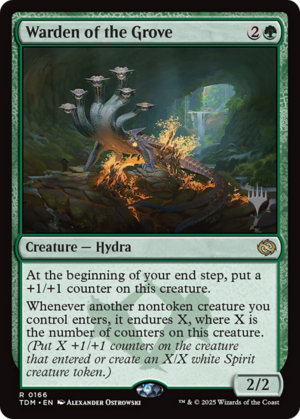
Card Details
Info
| Color: | |
| Identifies: | |
| Cost: |
|
| Rarity: | Rare |
| Converted Cost: | 3 |
| Power/Toughness: | 2/2 |
| Types: | |
| SubTypes: | |
| Languages: | 
     |
| Layout: | Normal |
| Rank: | |
| Saltiness: | |
| Tokens: |
Abilities/Keywords
Rules
Prices
Legalities
Standard
Standardbrawl
Vintage
Modern
Brawl
Historic
Duel
Alchemy
Predh
Oathbreaker
Commander
Pioneer
Oldschool
Timeless
Premodern
Penny
Pauper
Gladiator
Paupercommander
Future
Legacy
Text
At the beginning of your end step, put a +1/+1counteron this creature. Whenever another nontoken creature you control enters, it endures X, where X is the number of counters on this creature. (Put X +1/+1 counters on the creature that entered or create an X/X white Spirit creature token.)Less Synergy
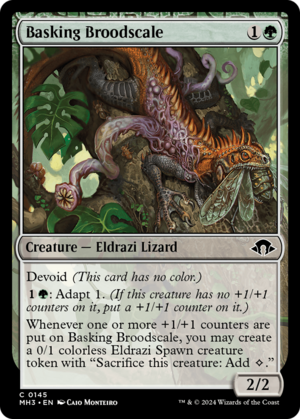
Card Details
Info
| Color: | |
| Identifies: | |
| Cost: |
|
| Rarity: | Common |
| Converted Cost: | 2 |
| Power/Toughness: | 2/2 |
| Types: | |
| SubTypes: | |
| Languages: | 
       |
| Layout: | Normal |
| Rank: | |
| Saltiness: | |
| Tokens: |
Abilities/Keywords
Rules
Prices
Legalities
Standard
Standardbrawl
Vintage
Modern
Brawl
Historic
Duel
Alchemy
Predh
Oathbreaker
Commander
Pioneer
Oldschool
Timeless
Premodern
Penny
Pauper
Gladiator
Paupercommander
Future
Legacy
Text
Devoid (This card has no color.)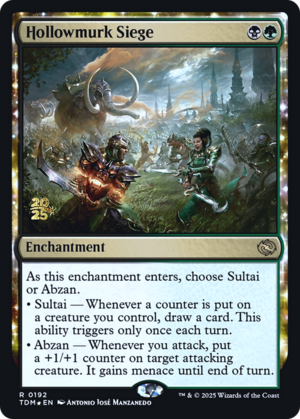
Card Details
Info
| Color: | |
| Identifies: | |
| Cost: |
|
| Rarity: | Rare |
| Converted Cost: | 2 |
| Power/Toughness: | / |
| Types: | |
| SubTypes: | |
| Languages: | 
     |
| Layout: | Normal |
| Rank: | |
| Saltiness: |
Rules
Text
As this enchantment enters, choose Sultai or Abzan. • Sultai — Whenever acounteris put on a creature you control, draw a card. This ability triggers only once each turn. • Abzan — Whenever you attack, put a +1/+1counteron target attacking creature. It gains menace until end of turn.
Card Details
Info
| Color: | |
| Identifies: | |
| Cost: | |
| Rarity: | Rare |
| Converted Cost: | 0 |
| Power/Toughness: | / |
| Types: | |
| SubTypes: | |
| Languages: | 
          |
| Layout: | Normal |
| Rank: | |
| Saltiness: |
Rules
Prices
Legalities
Standard
Standardbrawl
Vintage
Modern
Brawl
Historic
Duel
Alchemy
Predh
Oathbreaker
Commander
Pioneer
Oldschool
Timeless
Premodern
Penny
Pauper
Gladiator
Paupercommander
Future
Legacy
Text
(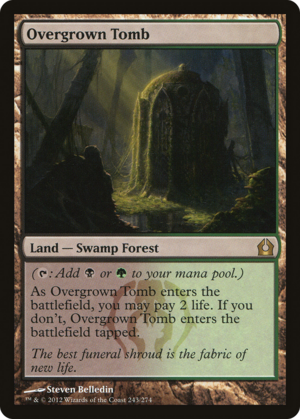
Card Details
Info
| Color: | |
| Identifies: | |
| Cost: | |
| Rarity: | Rare |
| Converted Cost: | 0 |
| Power/Toughness: | / |
| Types: | |
| SubTypes: | |
| Languages: | 
          |
| Layout: | Normal |
| Rank: | |
| Saltiness: |
Rules
Prices
Legalities
Standard
Standardbrawl
Vintage
Modern
Brawl
Historic
Duel
Alchemy
Predh
Oathbreaker
Commander
Pioneer
Oldschool
Timeless
Premodern
Penny
Pauper
Gladiator
Paupercommander
Future
Legacy
Text
(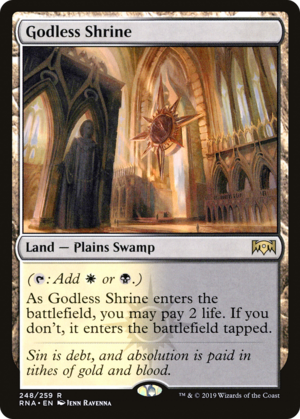
Card Details
Info
| Color: | |
| Identifies: | |
| Cost: | |
| Rarity: | Rare |
| Converted Cost: | 0 |
| Power/Toughness: | / |
| Types: | |
| SubTypes: | |
| Languages: | 
          |
| Layout: | Normal |
| Rank: | |
| Saltiness: |
Rules
Prices
Legalities
Standard
Standardbrawl
Vintage
Modern
Brawl
Historic
Duel
Alchemy
Predh
Oathbreaker
Commander
Pioneer
Oldschool
Timeless
Premodern
Penny
Pauper
Gladiator
Paupercommander
Future
Legacy
Text
(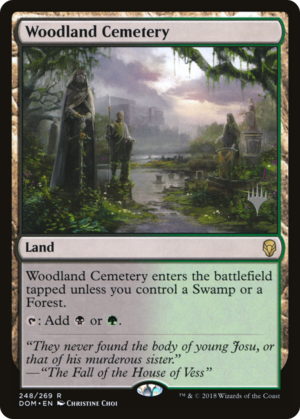
Card Details
Info
| Color: | |
| Identifies: | |
| Cost: | |
| Rarity: | Rare |
| Converted Cost: | 0 |
| Power/Toughness: | / |
| Types: | |
| SubTypes: | |
| Languages: | 
          |
| Layout: | Normal |
| Rank: | |
| Saltiness: |
Rules
Prices
Legalities
Standard
Standardbrawl
Vintage
Modern
Brawl
Historic
Duel
Alchemy
Predh
Oathbreaker
Commander
Pioneer
Oldschool
Timeless
Premodern
Penny
Pauper
Gladiator
Paupercommander
Future
Legacy
Text
This land enters tapped unless you control a Swamp or a Forest.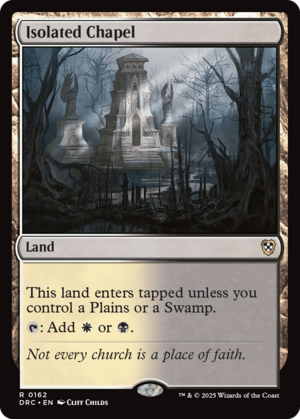
Card Details
Info
| Color: | |
| Identifies: | |
| Cost: | |
| Rarity: | Rare |
| Converted Cost: | 0 |
| Power/Toughness: | / |
| Types: | |
| SubTypes: | |
| Languages: | 
          |
| Layout: | Normal |
| Rank: | |
| Saltiness: |
Rules
Text
This land enters tapped unless you control a Plains or a Swamp.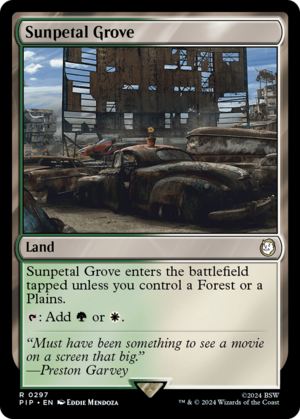
Card Details
Info
| Color: | |
| Identifies: | |
| Cost: | |
| Rarity: | Rare |
| Converted Cost: | 0 |
| Power/Toughness: | / |
| Types: | |
| SubTypes: | |
| Languages: | 
          |
| Layout: | Normal |
| Rank: | |
| Saltiness: |
Rules
Prices
Legalities
Standard
Standardbrawl
Vintage
Modern
Brawl
Historic
Duel
Alchemy
Predh
Oathbreaker
Commander
Pioneer
Oldschool
Timeless
Premodern
Penny
Pauper
Gladiator
Paupercommander
Future
Legacy
Text
This land enters tapped unless you control a Forest or a Plains.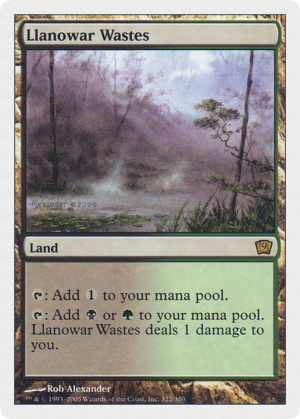
Card Details
Info
| Color: | |
| Identifies: | |
| Cost: | |
| Rarity: | Rare |
| Converted Cost: | 0 |
| Power/Toughness: | / |
| Types: | |
| SubTypes: | |
| Languages: | 
          |
| Layout: | Normal |
| Rank: | |
| Saltiness: |
Rules
Prices
Legalities
Standard
Standardbrawl
Vintage
Modern
Brawl
Historic
Duel
Alchemy
Predh
Oathbreaker
Commander
Pioneer
Oldschool
Timeless
Premodern
Penny
Pauper
Gladiator
Paupercommander
Future
Legacy
Text
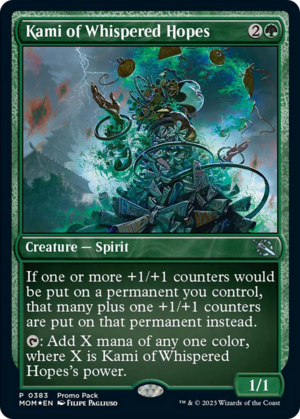
Card Details
Info
| Color: | |
| Identifies: | |
| Cost: |
|
| Rarity: | Uncommon |
| Converted Cost: | 3 |
| Power/Toughness: | 1/1 |
| Types: | |
| SubTypes: | |
| Languages: | 
       |
| Layout: | Normal |
| Rank: | |
| Saltiness: |
Rules
Prices
Legalities
Standard
Standardbrawl
Vintage
Modern
Brawl
Historic
Duel
Alchemy
Predh
Oathbreaker
Commander
Pioneer
Oldschool
Timeless
Premodern
Penny
Pauper
Gladiator
Paupercommander
Future
Legacy
Text
If one or more +1/+1 counters would be put on a permanent you control, that many plus one +1/+1 counters are put on that permanent instead.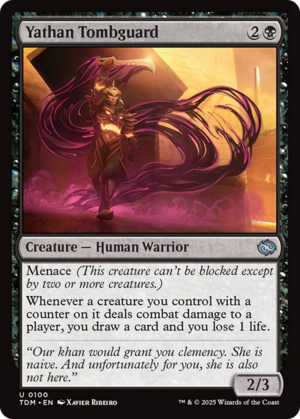
Card Details
Info
| Color: | |
| Identifies: | |
| Cost: |
|
| Rarity: | Uncommon |
| Converted Cost: | 3 |
| Power/Toughness: | 2/3 |
| Types: | |
| SubTypes: | |
| Languages: | 
     |
| Layout: | Normal |
| Rank: | |
| Saltiness: |
Abilities/Keywords
Rules
Prices
Legalities
Standard
Standardbrawl
Vintage
Modern
Brawl
Historic
Duel
Alchemy
Predh
Oathbreaker
Commander
Pioneer
Oldschool
Timeless
Premodern
Penny
Pauper
Gladiator
Paupercommander
Future
Legacy
Text
Menace (This creature can't be blocked except by two or more creatures.) Whenever a creature you control with acounteron it deals combat damage to a player, you draw a card and you lose 1 life.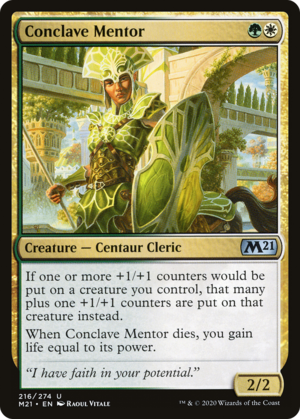
Card Details
Info
| Color: | |
| Identifies: | |
| Cost: |
|
| Rarity: | Uncommon |
| Converted Cost: | 2 |
| Power/Toughness: | 2/2 |
| Types: | |
| SubTypes: | |
| Languages: | 
          |
| Layout: | Normal |
| Rank: | |
| Saltiness: |
Rules
Prices
Legalities
Standard
Standardbrawl
Vintage
Modern
Brawl
Historic
Duel
Alchemy
Predh
Oathbreaker
Commander
Pioneer
Oldschool
Timeless
Premodern
Penny
Pauper
Gladiator
Paupercommander
Future
Legacy
Text
If one or more +1/+1 counters would be put on a creature you control, that many plus one +1/+1 counters are put on that creature instead. When this creature dies, you gain life equal to its power.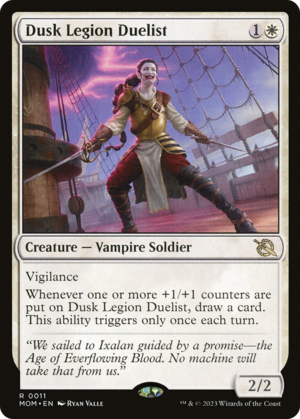
Card Details
Info
| Color: | |
| Identifies: | |
| Cost: |
|
| Rarity: | Rare |
| Converted Cost: | 2 |
| Power/Toughness: | 2/2 |
| Types: | |
| SubTypes: | |
| Languages: | 
       |
| Layout: | Normal |
| Rank: | |
| Saltiness: |
Abilities/Keywords
Rules
Prices
Legalities
Standard
Standardbrawl
Vintage
Modern
Brawl
Historic
Duel
Alchemy
Predh
Oathbreaker
Commander
Pioneer
Oldschool
Timeless
Premodern
Penny
Pauper
Gladiator
Paupercommander
Future
Legacy
Text
Vigilance Whenever one or more +1/+1 counters are put on this creature, draw a card. This ability triggers only once each turn.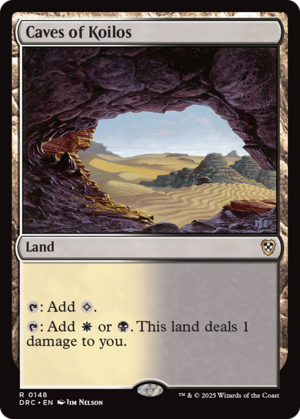
Card Details
Info
| Color: | |
| Identifies: | |
| Cost: | |
| Rarity: | Rare |
| Converted Cost: | 0 |
| Power/Toughness: | / |
| Types: | |
| SubTypes: | |
| Languages: | 
          |
| Layout: | Normal |
| Rank: | |
| Saltiness: |
Rules
Prices
Legalities
Standard
Standardbrawl
Vintage
Modern
Brawl
Historic
Duel
Alchemy
Predh
Oathbreaker
Commander
Pioneer
Oldschool
Timeless
Premodern
Penny
Pauper
Gladiator
Paupercommander
Future
Legacy
Text
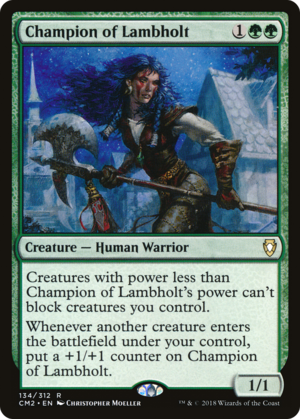
Card Details
Info
| Color: | |
| Identifies: | |
| Cost: |
|
| Rarity: | Rare |
| Converted Cost: | 3 |
| Power/Toughness: | 1/1 |
| Types: | |
| SubTypes: | |
| Languages: | 
          |
| Layout: | Normal |
| Rank: | |
| Saltiness: |
Rules
Text
Creatures with power less than this creature's power can't block creatures you control. Whenever another creature you control enters, put a +1/+1counteron this creature.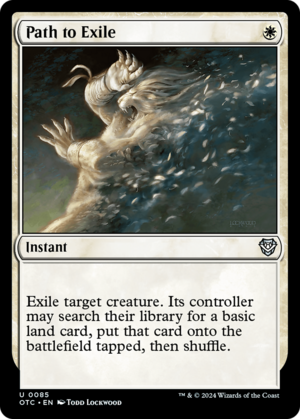
Card Details
Info
| Color: | |
| Identifies: | |
| Cost: |
|
| Rarity: | Uncommon |
| Converted Cost: | 1 |
| Power/Toughness: | / |
| Types: | |
| SubTypes: | |
| Languages: | 
         |
| Layout: | Normal |
| Rank: | |
| Saltiness: |
Rules
Text
Exile target creature. Its controller may search their library for a basic land card, put that card onto the battlefield tapped, thenshuffle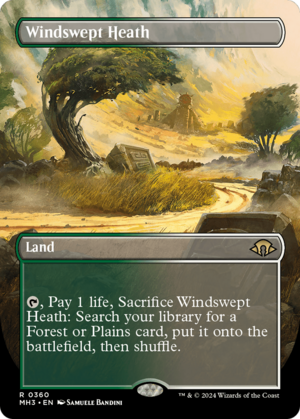
Card Details
Info
| Color: | |
| Identifies: | |
| Cost: | |
| Rarity: | Rare |
| Converted Cost: | 0 |
| Power/Toughness: | / |
| Types: | |
| SubTypes: | |
| Languages: | 
          |
| Layout: | Normal |
| Rank: | |
| Saltiness: |
Rules
Prices
Legalities
Standard
Standardbrawl
Vintage
Modern
Brawl
Historic
Duel
Alchemy
Predh
Oathbreaker
Commander
Pioneer
Oldschool
Timeless
Premodern
Penny
Pauper
Gladiator
Paupercommander
Future
Legacy
Text
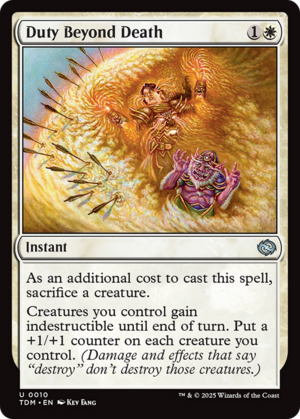
Card Details
Info
| Color: | |
| Identifies: | |
| Cost: |
|
| Rarity: | Uncommon |
| Converted Cost: | 2 |
| Power/Toughness: | / |
| Types: | |
| SubTypes: | |
| Languages: | 
     |
| Layout: | Normal |
| Rank: | |
| Saltiness: |
Rules
Prices
Legalities
Standard
Standardbrawl
Vintage
Modern
Brawl
Historic
Duel
Alchemy
Predh
Oathbreaker
Commander
Pioneer
Oldschool
Timeless
Premodern
Penny
Pauper
Gladiator
Paupercommander
Future
Legacy
Text
As an additional cost to cast this spell,sacrificea creature. Creatures you control gain indestructible until end of turn. Put a +1/+1counteron each creature you control. (Damage and effects that say "destroy" don'tdestroythose creatures.)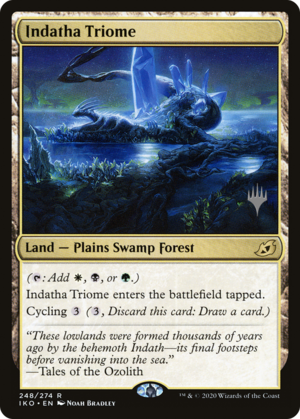
Card Details
Info
| Color: | |
| Identifies: | |
| Cost: | |
| Rarity: | Rare |
| Converted Cost: | 0 |
| Power/Toughness: | / |
| Types: | |
| SubTypes: | |
| Languages: | 
          |
| Layout: | Normal |
| Rank: | |
| Saltiness: |
Abilities/Keywords
Rules
Prices
Legalities
Standard
Standardbrawl
Vintage
Modern
Brawl
Historic
Duel
Alchemy
Predh
Oathbreaker
Commander
Pioneer
Oldschool
Timeless
Premodern
Penny
Pauper
Gladiator
Paupercommander
Future
Legacy
Text
(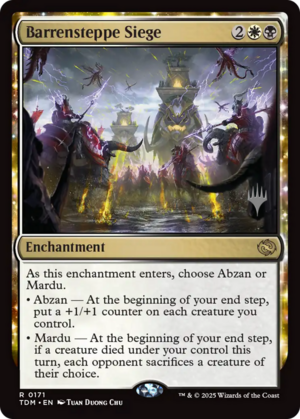
Card Details
Info
| Color: | |
| Identifies: | |
| Cost: |
|
| Rarity: | Rare |
| Converted Cost: | 4 |
| Power/Toughness: | / |
| Types: | |
| SubTypes: | |
| Languages: | 
     |
| Layout: | Normal |
| Rank: | |
| Saltiness: |
Rules
Prices
Legalities
Standard
Standardbrawl
Vintage
Modern
Brawl
Historic
Duel
Alchemy
Predh
Oathbreaker
Commander
Pioneer
Oldschool
Timeless
Premodern
Penny
Pauper
Gladiator
Paupercommander
Future
Legacy
Text
As this enchantment enters, choose Abzan or Mardu. • Abzan — At the beginning of your end step, put a +1/+1counteron each creature you control. • Mardu — At the beginning of your end step, if a creature died under your control this turn, each opponent sacrifices a creature of their choice.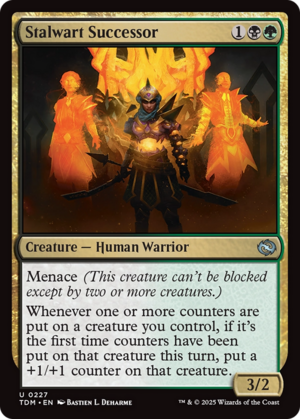
Card Details
Info
| Color: | |
| Identifies: | |
| Cost: |
|
| Rarity: | Uncommon |
| Converted Cost: | 3 |
| Power/Toughness: | 3/2 |
| Types: | |
| SubTypes: | |
| Languages: | 
     |
| Layout: | Normal |
| Rank: | |
| Saltiness: |
Abilities/Keywords
Rules
Prices
Legalities
Standard
Standardbrawl
Vintage
Modern
Brawl
Historic
Duel
Alchemy
Predh
Oathbreaker
Commander
Pioneer
Oldschool
Timeless
Premodern
Penny
Pauper
Gladiator
Paupercommander
Future
Legacy
Text
Menace (This creature can't be blocked except by two or more creatures.) Whenever one or more counters are put on a creature you control, if it's the first time counters have been put on that creature this turn, put a +1/+1counteron that creature.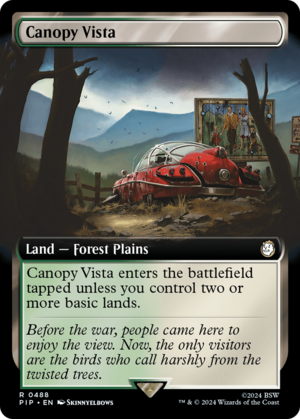
Card Details
Info
| Color: | |
| Identifies: | |
| Cost: | |
| Rarity: | Rare |
| Converted Cost: | 0 |
| Power/Toughness: | / |
| Types: | |
| SubTypes: | |
| Languages: | 
          |
| Layout: | Normal |
| Rank: | |
| Saltiness: |
Rules
Prices
Legalities
Standard
Standardbrawl
Vintage
Modern
Brawl
Historic
Duel
Alchemy
Predh
Oathbreaker
Commander
Pioneer
Oldschool
Timeless
Premodern
Penny
Pauper
Gladiator
Paupercommander
Future
Legacy
Text
(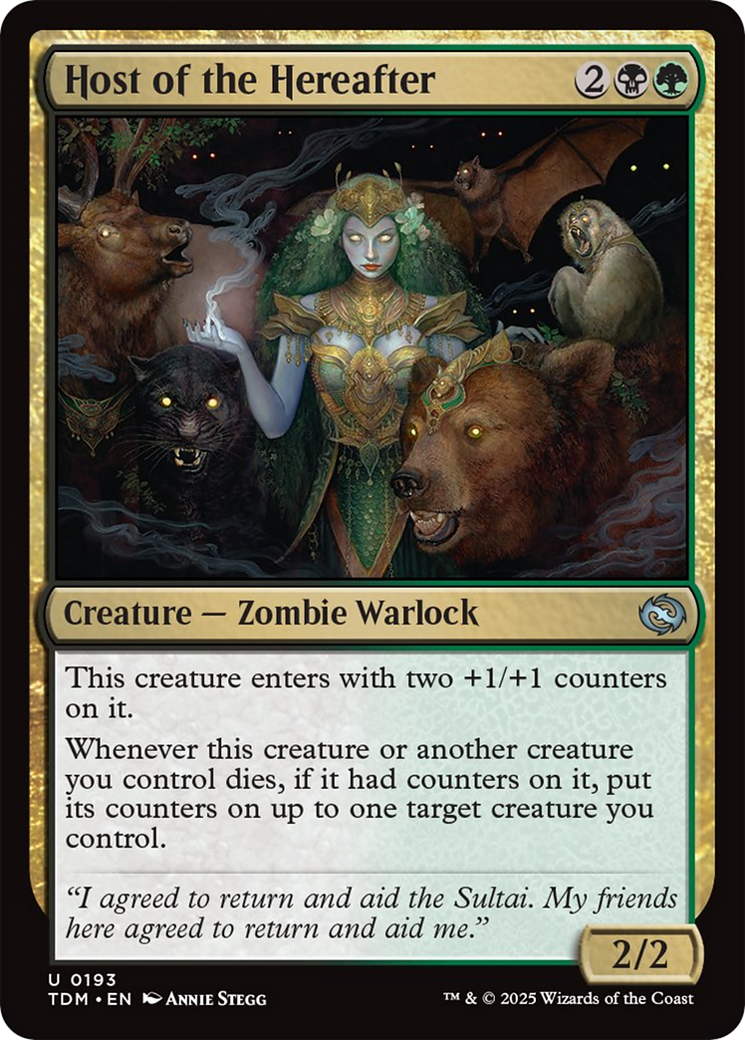
Card Details
Info
| Color: | |
| Identifies: | |
| Cost: |
|
| Rarity: | Uncommon |
| Converted Cost: | 4 |
| Power/Toughness: | 2/2 |
| Types: | |
| SubTypes: | |
| Languages: | 
     |
| Layout: | Normal |
| Rank: | |
| Saltiness: |
Rules
Prices
Legalities
Standard
Standardbrawl
Vintage
Modern
Brawl
Historic
Duel
Alchemy
Predh
Oathbreaker
Commander
Pioneer
Oldschool
Timeless
Premodern
Penny
Pauper
Gladiator
Paupercommander
Future
Legacy
Text
This creature enters with two +1/+1 counters on it. Whenever this creature or another creature you control dies, if it had counters on it, put its counters on up to one target creature you control.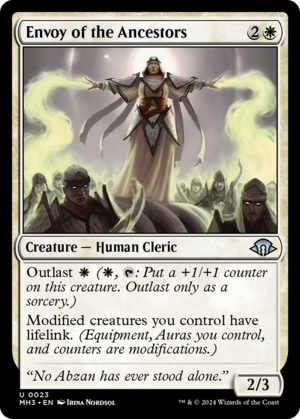
Card Details
Info
| Color: | |
| Identifies: | |
| Cost: |
|
| Rarity: | Uncommon |
| Converted Cost: | 3 |
| Power/Toughness: | 2/3 |
| Types: | |
| SubTypes: | |
| Languages: | 
       |
| Layout: | Normal |
| Rank: | |
| Saltiness: |
Abilities/Keywords
Rules
Prices
Legalities
Standard
Standardbrawl
Vintage
Modern
Brawl
Historic
Duel
Alchemy
Predh
Oathbreaker
Commander
Pioneer
Oldschool
Timeless
Premodern
Penny
Pauper
Gladiator
Paupercommander
Future
Legacy
Text
Outlast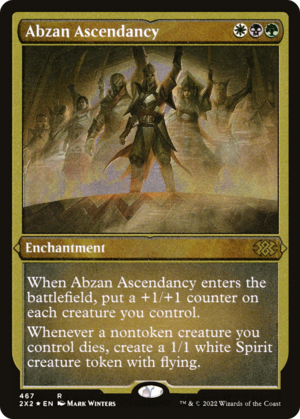
Card Details
Info
| Color: | |
| Identifies: | |
| Cost: |
|
| Rarity: | Rare |
| Converted Cost: | 3 |
| Power/Toughness: | / |
| Types: | |
| SubTypes: | |
| Languages: | 
          |
| Layout: | Normal |
| Rank: | |
| Saltiness: | |
| Tokens: |
Rules
Prices
Legalities
Standard
Standardbrawl
Vintage
Modern
Brawl
Historic
Duel
Alchemy
Predh
Oathbreaker
Commander
Pioneer
Oldschool
Timeless
Premodern
Penny
Pauper
Gladiator
Paupercommander
Future
Legacy
Text
When this enchantment enters, put a +1/+1counteron each creature you control. Whenever a nontoken creature you control dies, create a 1/1 white Spirit creature token with flying.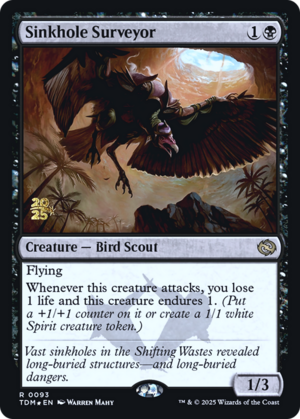
Card Details
Info
| Color: | |
| Identifies: | |
| Cost: |
|
| Rarity: | Rare |
| Converted Cost: | 2 |
| Power/Toughness: | 1/3 |
| Types: | |
| SubTypes: | |
| Languages: | 
     |
| Layout: | Normal |
| Rank: | |
| Saltiness: | |
| Tokens: |
Abilities/Keywords
Rules
Text
Flying Whenever this creature attacks, you lose 1 life and this creature endures 1. (Put a +1/+1counteron it or create a 1/1 white Spirit creature token.)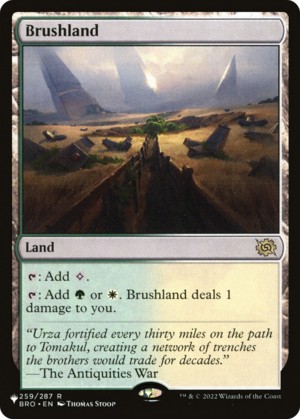
Card Details
Info
| Color: | |
| Identifies: | |
| Cost: | |
| Rarity: | Rare |
| Converted Cost: | 0 |
| Power/Toughness: | / |
| Types: | |
| SubTypes: | |
| Languages: | 
        |
| Layout: | Normal |
| Rank: | |
| Saltiness: |
Rules
Text
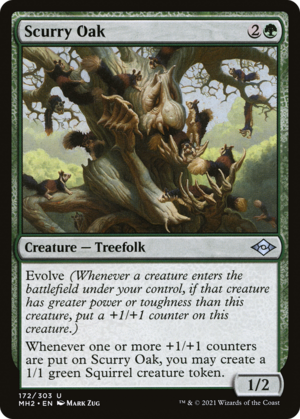
Card Details
Info
| Color: | |
| Identifies: | |
| Cost: |
|
| Rarity: | Uncommon |
| Converted Cost: | 3 |
| Power/Toughness: | 1/2 |
| Types: | |
| SubTypes: | |
| Languages: | 
          |
| Layout: | Normal |
| Rank: | |
| Saltiness: | |
| Tokens: |
Abilities/Keywords
Rules
Prices
Legalities
Standard
Standardbrawl
Vintage
Modern
Brawl
Historic
Duel
Alchemy
Predh
Oathbreaker
Commander
Pioneer
Oldschool
Timeless
Premodern
Penny
Pauper
Gladiator
Paupercommander
Future
Legacy
Text
Evolve (Whenever a creature you control enters, if that creature has greater power or toughness than this creature, put a +1/+1counteron this creature.) Whenever one or more +1/+1 counters are put on this creature, you may create a 1/1 green Squirrel creature token.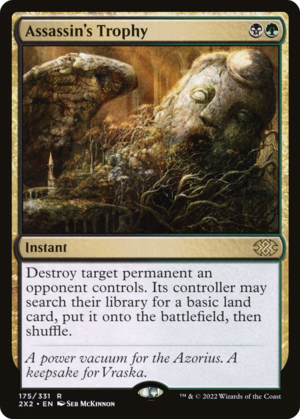
Card Details
Info
| Color: | |
| Identifies: | |
| Cost: |
|
| Rarity: | Rare |
| Converted Cost: | 2 |
| Power/Toughness: | / |
| Types: | |
| SubTypes: | |
| Languages: | 
          |
| Layout: | Normal |
| Rank: | |
| Saltiness: |
Rules
Prices
Legalities
Standard
Standardbrawl
Vintage
Modern
Brawl
Historic
Duel
Alchemy
Predh
Oathbreaker
Commander
Pioneer
Oldschool
Timeless
Premodern
Penny
Pauper
Gladiator
Paupercommander
Future
Legacy
Text
Destroy target permanent an opponent controls. Its controller may search their library for a basic land card, put it onto the battlefield, thenshuffle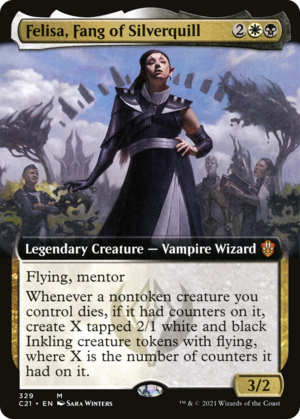
Card Details
Info
| Color: | |
| Identifies: | |
| Cost: |
|
| Rarity: | Mythic |
| Converted Cost: | 4 |
| Power/Toughness: | 3/2 |
| Types: | |
| SubTypes: | |
| Languages: | 
         |
| Layout: | Normal |
| Rank: | |
| Saltiness: | |
| Tokens: |
Abilities/Keywords
Rules
Prices
Legalities
Standard
Standardbrawl
Vintage
Modern
Brawl
Historic
Duel
Alchemy
Predh
Oathbreaker
Commander
Pioneer
Oldschool
Timeless
Premodern
Penny
Pauper
Gladiator
Paupercommander
Future
Legacy
Text
Flying Mentor (Whenever this creature attacks, put a +1/+1counteron target attacking creature with lesser power.) Whenever a nontoken creature you control dies, if it had counters on it, create X tapped 2/1 white and black Inkling creature tokens with flying, where X is the number of counters it had on it.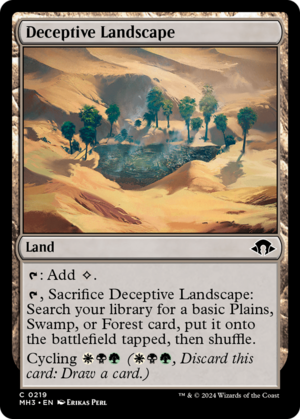
Card Details
Info
| Color: | |
| Identifies: | |
| Cost: | |
| Rarity: | Common |
| Converted Cost: | 0 |
| Power/Toughness: | / |
| Types: | |
| SubTypes: | |
| Languages: | 
       |
| Layout: | Normal |
| Rank: | |
| Saltiness: |
Abilities/Keywords
Rules
Prices
Legalities
Standard
Standardbrawl
Vintage
Modern
Brawl
Historic
Duel
Alchemy
Predh
Oathbreaker
Commander
Pioneer
Oldschool
Timeless
Premodern
Penny
Pauper
Gladiator
Paupercommander
Future
Legacy
Text
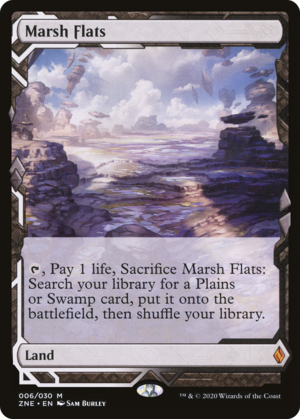
Card Details
Info
| Color: | |
| Identifies: | |
| Cost: | |
| Rarity: | Mythic |
| Converted Cost: | 0 |
| Power/Toughness: | / |
| Types: | |
| SubTypes: | |
| Languages: | 
          |
| Layout: | Normal |
| Rank: | |
| Saltiness: |
Rules
Prices
Legalities
Standard
Standardbrawl
Vintage
Modern
Brawl
Historic
Duel
Alchemy
Predh
Oathbreaker
Commander
Pioneer
Oldschool
Timeless
Premodern
Penny
Pauper
Gladiator
Paupercommander
Future
Legacy
Text
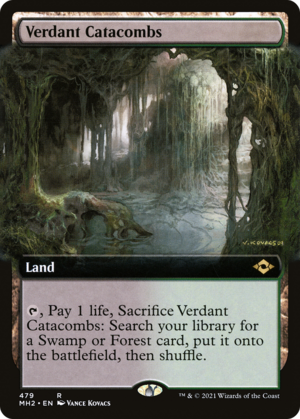
Card Details
Info
| Color: | |
| Identifies: | |
| Cost: | |
| Rarity: | Rare |
| Converted Cost: | 0 |
| Power/Toughness: | / |
| Types: | |
| SubTypes: | |
| Languages: | 
          |
| Layout: | Normal |
| Rank: | |
| Saltiness: |
Rules
Prices
Legalities
Standard
Standardbrawl
Vintage
Modern
Brawl
Historic
Duel
Alchemy
Predh
Oathbreaker
Commander
Pioneer
Oldschool
Timeless
Premodern
Penny
Pauper
Gladiator
Paupercommander
Future
Legacy
Text
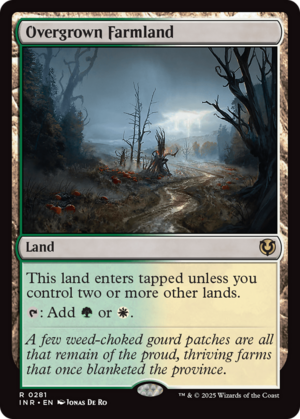
Card Details
Info
| Color: | |
| Identifies: | |
| Cost: | |
| Rarity: | Rare |
| Converted Cost: | 0 |
| Power/Toughness: | / |
| Types: | |
| SubTypes: | |
| Languages: | 
          |
| Layout: | Normal |
| Rank: | |
| Saltiness: |
Rules
Prices
Legalities
Standard
Standardbrawl
Vintage
Modern
Brawl
Historic
Duel
Alchemy
Predh
Oathbreaker
Commander
Pioneer
Oldschool
Timeless
Premodern
Penny
Pauper
Gladiator
Paupercommander
Future
Legacy
Text
This land enters tapped unless you control two or more other lands.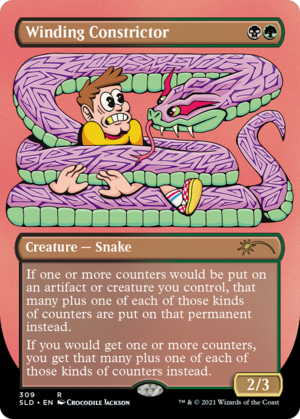
Card Details
Info
| Color: | |
| Identifies: | |
| Cost: |
|
| Rarity: | Rare |
| Converted Cost: | 2 |
| Power/Toughness: | 2/3 |
| Types: | |
| SubTypes: | |
| Languages: | 
          |
| Layout: | Normal |
| Rank: | |
| Saltiness: |
Rules
Prices
Legalities
Standard
Standardbrawl
Vintage
Modern
Brawl
Historic
Duel
Alchemy
Predh
Oathbreaker
Commander
Pioneer
Oldschool
Timeless
Premodern
Penny
Pauper
Gladiator
Paupercommander
Future
Legacy
Text
If one or more counters would be put on an artifact or creature you control, that many plus one of each of those kinds of counters are put on that permanent instead. If you would get one or more counters, you get that many plus one of each of those kinds of counters instead.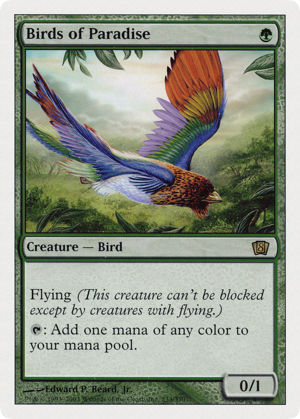
Card Details
Info
| Color: | |
| Identifies: | |
| Cost: |
|
| Rarity: | Rare |
| Converted Cost: | 1 |
| Power/Toughness: | 0/1 |
| Types: | |
| SubTypes: | |
| Languages: | 
          |
| Layout: | Normal |
| Rank: | |
| Saltiness: |
Abilities/Keywords
Rules
Prices
| Seller | Price |
|---|---|
| Cardkingdom | / 449.99 USD 16.99 USD |
| Tcgplayer | 11.68 USD / 219.99 USD |
| Cardmarket | 5.11 EUR / 120.47 EUR |
Legalities
Standard
Standardbrawl
Vintage
Modern
Brawl
Historic
Duel
Alchemy
Predh
Oathbreaker
Commander
Pioneer
Oldschool
Timeless
Premodern
Penny
Pauper
Gladiator
Paupercommander
Future
Legacy
Text
Flying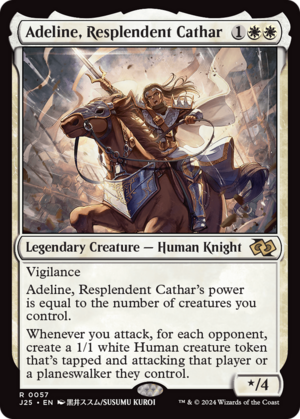
Card Details
Info
| Color: | |
| Identifies: | |
| Cost: |
|
| Rarity: | Rare |
| Converted Cost: | 3 |
| Power/Toughness: | */4 |
| Types: | |
| SubTypes: | |
| Languages: | 
          |
| Layout: | Normal |
| Rank: | |
| Saltiness: | |
| Tokens: |
Abilities/Keywords
Rules
Text
Vigilance Adeline's power is equal to the number of creatures you control. Whenever you attack, for each opponent, create a 1/1 white Human creature token that's tapped and attacking that player or a planeswalker they control.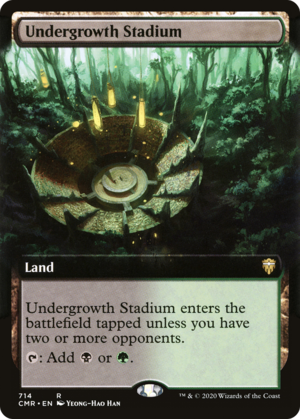
Card Details
Info
| Color: | |
| Identifies: | |
| Cost: | |
| Rarity: | Rare |
| Converted Cost: | 0 |
| Power/Toughness: | / |
| Types: | |
| SubTypes: | |
| Languages: | 
        |
| Layout: | Normal |
| Rank: | |
| Saltiness: |
Rules
Prices
Legalities
Standard
Standardbrawl
Vintage
Modern
Brawl
Historic
Duel
Alchemy
Predh
Oathbreaker
Commander
Pioneer
Oldschool
Timeless
Premodern
Penny
Pauper
Gladiator
Paupercommander
Future
Legacy
Text
This land enters tapped unless you have two or more opponents.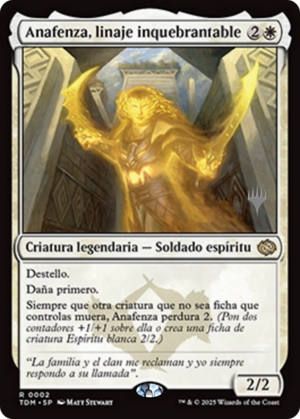
Card Details
Info
| Color: | |
| Identifies: | |
| Cost: |
|
| Rarity: | Rare |
| Converted Cost: | 3 |
| Power/Toughness: | 2/2 |
| Types: | |
| SubTypes: | |
| Languages: | 
     |
| Layout: | Normal |
| Rank: | |
| Saltiness: | |
| Tokens: |
Abilities/Keywords
Rules
Prices
Legalities
Standard
Standardbrawl
Vintage
Modern
Brawl
Historic
Duel
Alchemy
Predh
Oathbreaker
Commander
Pioneer
Oldschool
Timeless
Premodern
Penny
Pauper
Gladiator
Paupercommander
Future
Legacy
Text
Flash First strike Whenever another nontoken creature you control dies, Anafenza endures 2. (Put two +1/+1 counters on it or create a 2/2 white Spirit creature token.)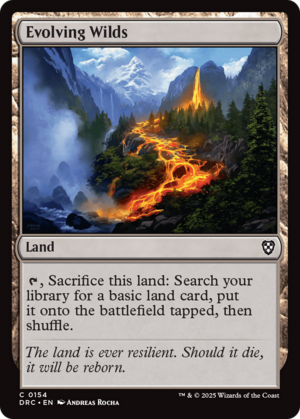
Card Details
Info
| Color: | |
| Identifies: | |
| Cost: | |
| Rarity: | Common |
| Converted Cost: | 0 |
| Power/Toughness: | / |
| Types: | |
| SubTypes: | |
| Languages: | 
          |
| Layout: | Normal |
| Rank: | |
| Saltiness: |
Rules
Text
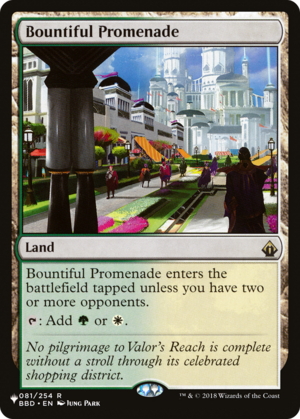
Card Details
Info
| Color: | |
| Identifies: | |
| Cost: | |
| Rarity: | Rare |
| Converted Cost: | 0 |
| Power/Toughness: | / |
| Types: | |
| SubTypes: | |
| Languages: | 
          |
| Layout: | Normal |
| Rank: | |
| Saltiness: |
Rules
Text
This land enters tapped unless you have two or more opponents.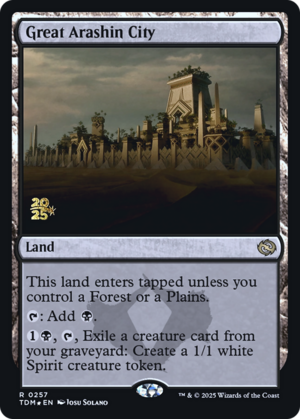
Card Details
Info
| Color: | |
| Identifies: | |
| Cost: | |
| Rarity: | Rare |
| Converted Cost: | 0 |
| Power/Toughness: | / |
| Types: | |
| SubTypes: | |
| Languages: | 
     |
| Layout: | Normal |
| Rank: | |
| Saltiness: | |
| Tokens: |
Rules
Text
This land enters tapped unless you control a Forest or a Plains.
Card Details
Info
| Color: | |
| Identifies: | |
| Cost: |
|
| Rarity: | Common |
| Converted Cost: | 2 |
| Power/Toughness: | / |
| Types: | |
| SubTypes: | |
| Languages: | 
          |
| Layout: | Normal |
| Rank: | |
| Saltiness: |
Rules
Text
Search your library for a Plains, Island, Swamp, or Mountain card, put it onto the battlefield tapped, thenshuffle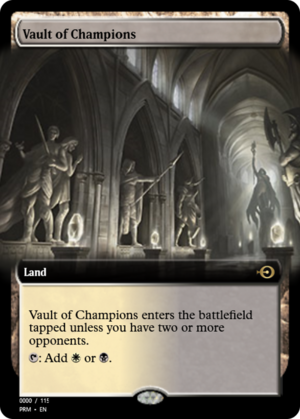
Card Details
Info
| Color: | |
| Identifies: | |
| Cost: | |
| Rarity: | Rare |
| Converted Cost: | 0 |
| Power/Toughness: | / |
| Types: | |
| SubTypes: | |
| Languages: | 
        |
| Layout: | Normal |
| Rank: | |
| Saltiness: |
Rules
Prices
| Seller | Price |
|---|
Legalities
Standard
Standardbrawl
Vintage
Modern
Brawl
Historic
Duel
Alchemy
Predh
Oathbreaker
Commander
Pioneer
Oldschool
Timeless
Premodern
Penny
Pauper
Gladiator
Paupercommander
Future
Legacy
Text
This land enters tapped unless you have two or more opponents.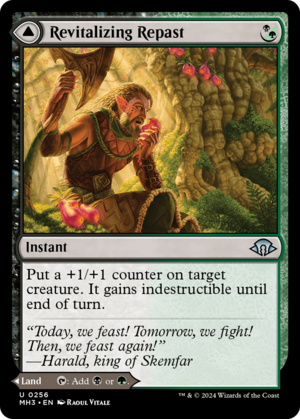
Card Details
- Card Faces:
- Revitalizing Repast (Front)
- Old-Growth Grove (Back)
Info
| Color: | |
| Identifies: | |
| Cost: |
|
| Rarity: | Uncommon |
| Converted Cost: | 1 |
| Power/Toughness: | / |
| Types: | |
| SubTypes: | |
| Languages: | 
       |
| Layout: | Modal Dfc |
| Rank: | |
| Saltiness: |
Rules
Prices
Legalities
Standard
Standardbrawl
Vintage
Modern
Brawl
Historic
Duel
Alchemy
Predh
Oathbreaker
Commander
Pioneer
Oldschool
Timeless
Premodern
Penny
Pauper
Gladiator
Paupercommander
Future
Legacy
Text
Put a +1/+1counteron target creature. It gains indestructible until end of turn.Info
| Color: | |
| Identifies: | |
| Cost: | |
| Rarity: | Uncommon |
| Converted Cost: | 0 |
| Power/Toughness: | / |
| Types: | |
| SubTypes: | |
| Languages: | 
       |
| Layout: | Modal Dfc |
| Rank: | |
| Saltiness: |
Rules
Prices
Legalities
Standard
Standardbrawl
Vintage
Modern
Brawl
Historic
Duel
Alchemy
Predh
Oathbreaker
Commander
Pioneer
Oldschool
Timeless
Premodern
Penny
Pauper
Gladiator
Paupercommander
Future
Legacy
Text
This land enters tapped.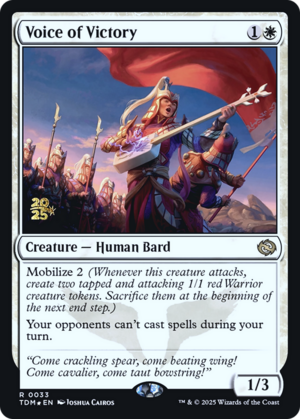
Card Details
Info
| Color: | |
| Identifies: | |
| Cost: |
|
| Rarity: | Rare |
| Converted Cost: | 2 |
| Power/Toughness: | 1/3 |
| Types: | |
| SubTypes: | |
| Languages: | 
     |
| Layout: | Normal |
| Rank: | |
| Saltiness: | |
| Tokens: |
Abilities/Keywords
Rules
Text
Mobilize 2 (Whenever this creature attacks, create two tapped and attacking 1/1 red Warrior creature tokens.Sacrificethem at the beginning of the next end step.) Your opponents can't cast spells during your turn.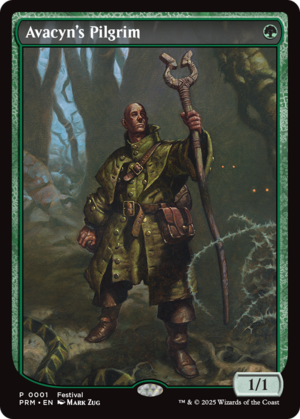
Card Details
Info
| Color: | |
| Identifies: | |
| Cost: |
|
| Rarity: | Rare |
| Converted Cost: | 1 |
| Power/Toughness: | 1/1 |
| Types: | |
| SubTypes: | |
| Languages: | 
          |
| Layout: | Normal |
| Rank: | |
| Saltiness: |
Rules
Prices
Legalities
Standard
Standardbrawl
Vintage
Modern
Brawl
Historic
Duel
Alchemy
Predh
Oathbreaker
Commander
Pioneer
Oldschool
Timeless
Premodern
Penny
Pauper
Gladiator
Paupercommander
Future
Legacy
Text
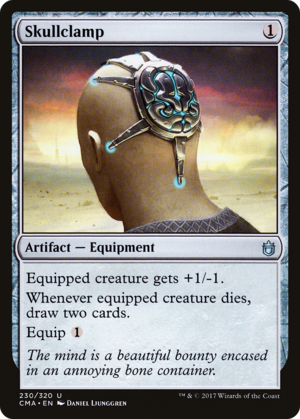
Card Details
Info
| Color: | |
| Identifies: | |
| Cost: |
|
| Rarity: | Uncommon |
| Converted Cost: | 1 |
| Power/Toughness: | / |
| Types: | |
| SubTypes: | |
| Languages: | 
         |
| Layout: | Normal |
| Rank: | |
| Saltiness: |
Abilities/Keywords
Rules
Prices
Legalities
Standard
Standardbrawl
Vintage
Modern
Brawl
Historic
Duel
Alchemy
Predh
Oathbreaker
Commander
Pioneer
Oldschool
Timeless
Premodern
Penny
Pauper
Gladiator
Paupercommander
Future
Legacy
Text
Equipped creature gets +1/-1. Whenever equipped creature dies, draw two cards. Equip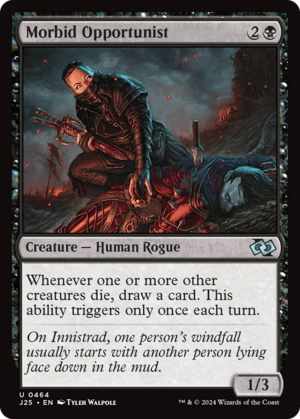
Card Details
Info
| Color: | |
| Identifies: | |
| Cost: |
|
| Rarity: | Uncommon |
| Converted Cost: | 3 |
| Power/Toughness: | 1/3 |
| Types: | |
| SubTypes: | |
| Languages: | 
          |
| Layout: | Normal |
| Rank: | |
| Saltiness: |
Rules
Text
Whenever one or more other creatures die, draw a card. This ability triggers only once each turn.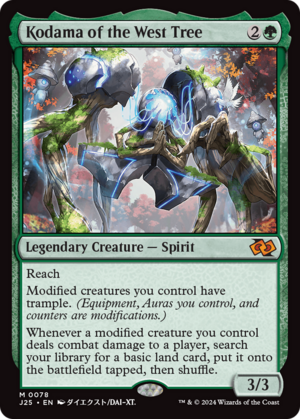
Card Details
Info
| Color: | |
| Identifies: | |
| Cost: |
|
| Rarity: | Mythic |
| Converted Cost: | 3 |
| Power/Toughness: | 3/3 |
| Types: | |
| SubTypes: | |
| Languages: | 
          |
| Layout: | Normal |
| Rank: | |
| Saltiness: |
Abilities/Keywords
Rules
Text
Reach Modified creatures you control have trample. (Equipment, Auras you control, and counters are modifications.) Whenever a modified creature you control deals combat damage to a player, search your library for a basic land card, put it onto the battlefield tapped, thenshuffle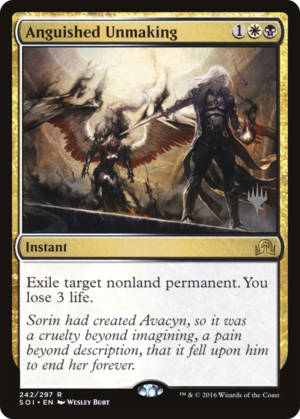
Card Details
Info
| Color: | |
| Identifies: | |
| Cost: |
|
| Rarity: | Rare |
| Converted Cost: | 3 |
| Power/Toughness: | / |
| Types: | |
| SubTypes: | |
| Languages: | 
          |
| Layout: | Normal |
| Rank: | |
| Saltiness: |
Rules
Prices
Legalities
Standard
Standardbrawl
Vintage
Modern
Brawl
Historic
Duel
Alchemy
Predh
Oathbreaker
Commander
Pioneer
Oldschool
Timeless
Premodern
Penny
Pauper
Gladiator
Paupercommander
Future
Legacy
Text
Exile target nonland permanent. You lose 3 life.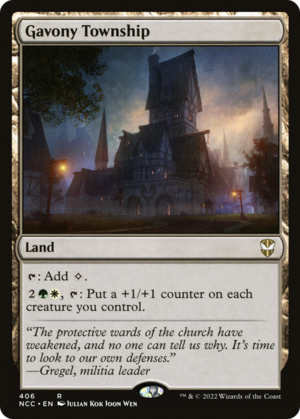
Card Details
Info
| Color: | |
| Identifies: | |
| Cost: | |
| Rarity: | Rare |
| Converted Cost: | 0 |
| Power/Toughness: | / |
| Types: | |
| SubTypes: | |
| Languages: | 
          |
| Layout: | Normal |
| Rank: | |
| Saltiness: |
Rules
Text
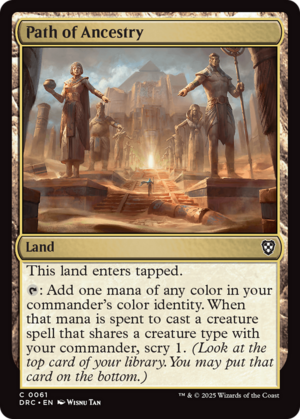
Card Details
Info
| Color: | |
| Identifies: | |
| Cost: | |
| Rarity: | Common |
| Converted Cost: | 0 |
| Power/Toughness: | / |
| Types: | |
| SubTypes: | |
| Languages: | 
         |
| Layout: | Normal |
| Rank: | |
| Saltiness: |
Abilities/Keywords
Rules
Text
This land enters tapped.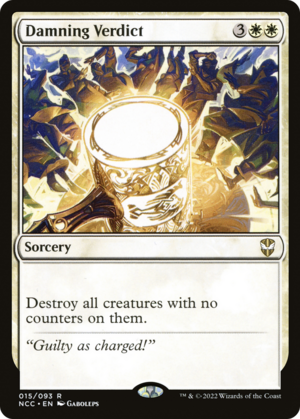
Card Details
Info
| Color: | |
| Identifies: | |
| Cost: |
|
| Rarity: | Rare |
| Converted Cost: | 5 |
| Power/Toughness: | / |
| Types: | |
| SubTypes: | |
| Languages: | 
         |
| Layout: | Normal |
| Rank: | |
| Saltiness: |
Rules
Prices
Legalities
Standard
Standardbrawl
Vintage
Modern
Brawl
Historic
Duel
Alchemy
Predh
Oathbreaker
Commander
Pioneer
Oldschool
Timeless
Premodern
Penny
Pauper
Gladiator
Paupercommander
Future
Legacy
Text
Destroy all creatures with no counters on them.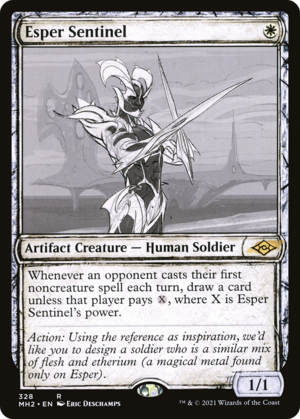
Card Details
Info
| Color: | |
| Identifies: | |
| Cost: |
|
| Rarity: | Rare |
| Converted Cost: | 1 |
| Power/Toughness: | 1/1 |
| Types: | |
| SubTypes: | |
| Languages: | 
          |
| Layout: | Normal |
| Rank: | |
| Saltiness: |
Rules
Prices
Legalities
Standard
Standardbrawl
Vintage
Modern
Brawl
Historic
Duel
Alchemy
Predh
Oathbreaker
Commander
Pioneer
Oldschool
Timeless
Premodern
Penny
Pauper
Gladiator
Paupercommander
Future
Legacy
Text
Whenever an opponent casts their first noncreature spell each turn, draw a card unless that player pays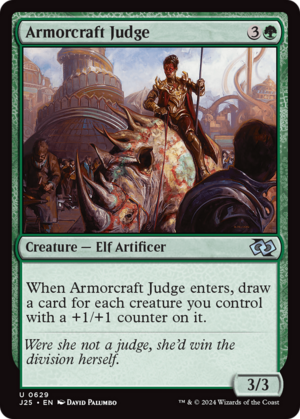
Card Details
Info
| Color: | |
| Identifies: | |
| Cost: |
|
| Rarity: | Uncommon |
| Converted Cost: | 4 |
| Power/Toughness: | 3/3 |
| Types: | |
| SubTypes: | |
| Languages: | 
          |
| Layout: | Normal |
| Rank: | |
| Saltiness: |
Rules
Text
When this creature enters, draw a card for each creature you control with a +1/+1counteron it.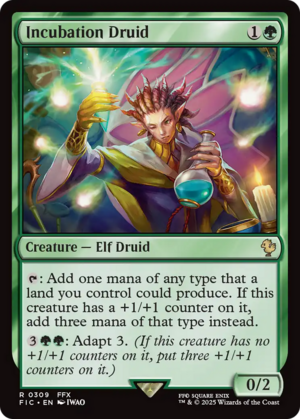
Card Details
Info
| Color: | |
| Identifies: | |
| Cost: |
|
| Rarity: | Rare |
| Converted Cost: | 2 |
| Power/Toughness: | 0/2 |
| Types: | |
| SubTypes: | |
| Languages: | 
          |
| Layout: | Normal |
| Rank: | |
| Saltiness: |
Abilities/Keywords
Rules
Prices
Legalities
Standard
Standardbrawl
Vintage
Modern
Brawl
Historic
Duel
Alchemy
Predh
Oathbreaker
Commander
Pioneer
Oldschool
Timeless
Premodern
Penny
Pauper
Gladiator
Paupercommander
Future
Legacy
Text
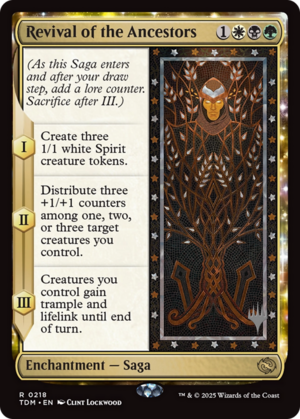
Card Details
Info
| Color: | |
| Identifies: | |
| Cost: |
|
| Rarity: | Rare |
| Converted Cost: | 4 |
| Power/Toughness: | / |
| Types: | |
| SubTypes: | |
| Languages: | 
     |
| Layout: | Saga |
| Rank: | |
| Saltiness: | |
| Tokens: |
Rules
Prices
Legalities
Standard
Standardbrawl
Vintage
Modern
Brawl
Historic
Duel
Alchemy
Predh
Oathbreaker
Commander
Pioneer
Oldschool
Timeless
Premodern
Penny
Pauper
Gladiator
Paupercommander
Future
Legacy
Text
(As this Saga enters and after your draw step, add a lorecounterSacrificeafter III.) I — Create three 1/1 white Spirit creature tokens. II — Distribute three +1/+1 counters among one, two, or three target creatures you control. III — Creatures you control gain trample and lifelink until end of turn.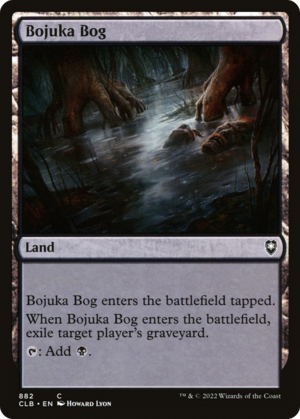
Card Details
Info
| Color: | |
| Identifies: | |
| Cost: | |
| Rarity: | Common |
| Converted Cost: | 0 |
| Power/Toughness: | / |
| Types: | |
| SubTypes: | |
| Languages: | 
         |
| Layout: | Normal |
| Rank: | |
| Saltiness: |
Rules
Prices
Legalities
Standard
Standardbrawl
Vintage
Modern
Brawl
Historic
Duel
Alchemy
Predh
Oathbreaker
Commander
Pioneer
Oldschool
Timeless
Premodern
Penny
Pauper
Gladiator
Paupercommander
Future
Legacy
Text
This land enters tapped. When this land enters, exile target player's graveyard.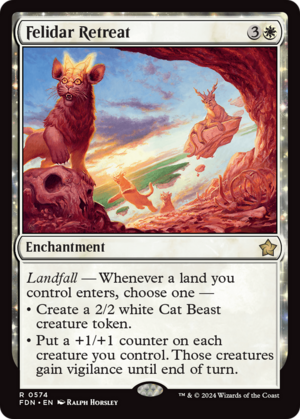
Card Details
Info
| Color: | |
| Identifies: | |
| Cost: |
|
| Rarity: | Rare |
| Converted Cost: | 4 |
| Power/Toughness: | / |
| Types: | |
| SubTypes: | |
| Languages: | 
          |
| Layout: | Normal |
| Rank: | |
| Saltiness: | |
| Tokens: |
Abilities/Keywords
Rules
Text
Landfall — Whenever a land you control enters, choose one — • Create a 2/2 white Cat Beast creature token. • Put a +1/+1counteron each creature you control. Those creatures gain vigilance until end of turn.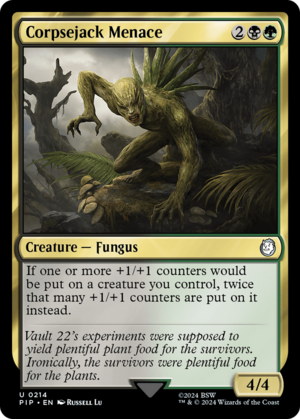
Card Details
Info
| Color: | |
| Identifies: | |
| Cost: |
|
| Rarity: | Uncommon |
| Converted Cost: | 4 |
| Power/Toughness: | 4/4 |
| Types: | |
| SubTypes: | |
| Languages: | 
          |
| Layout: | Normal |
| Rank: | |
| Saltiness: |
Rules
Prices
Legalities
Standard
Standardbrawl
Vintage
Modern
Brawl
Historic
Duel
Alchemy
Predh
Oathbreaker
Commander
Pioneer
Oldschool
Timeless
Premodern
Penny
Pauper
Gladiator
Paupercommander
Future
Legacy
Text
If one or more +1/+1 counters would be put on a creature you control, twice that many +1/+1 counters are put on it instead.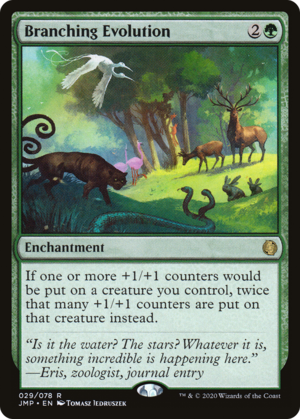
Card Details
Info
| Color: | |
| Identifies: | |
| Cost: |
|
| Rarity: | Rare |
| Converted Cost: | 3 |
| Power/Toughness: | / |
| Types: | |
| SubTypes: | |
| Languages: | 
       |
| Layout: | Normal |
| Rank: | |
| Saltiness: |
Rules
Prices
Legalities
Standard
Standardbrawl
Vintage
Modern
Brawl
Historic
Duel
Alchemy
Predh
Oathbreaker
Commander
Pioneer
Oldschool
Timeless
Premodern
Penny
Pauper
Gladiator
Paupercommander
Future
Legacy
Text
If one or more +1/+1 counters would be put on a creature you control, twice that many +1/+1 counters are put on that creature instead.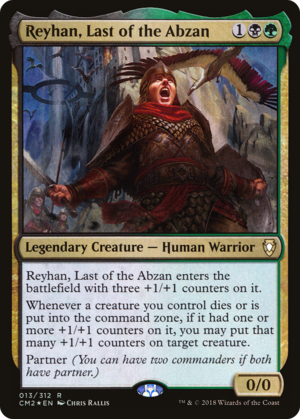
Card Details
Info
| Color: | |
| Identifies: | |
| Cost: |
|
| Rarity: | Rare |
| Converted Cost: | 3 |
| Power/Toughness: | 0/0 |
| Types: | |
| SubTypes: | |
| Languages: | 
        |
| Layout: | Normal |
| Rank: | |
| Saltiness: |
Abilities/Keywords
Rules
Text
Reyhan enters with three +1/+1 counters on it. Whenever a creature you control dies or is put into the command zone, if it had one or more +1/+1 counters on it, you may put that many +1/+1 counters on target creature. Partner (You can have two commanders if both have partner.)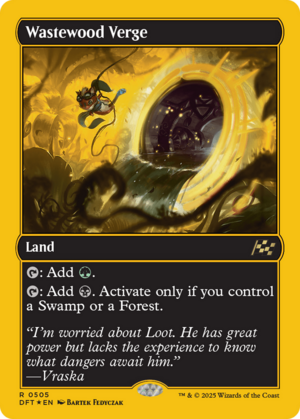
Card Details
Info
| Color: | |
| Identifies: | |
| Cost: | |
| Rarity: | Rare |
| Converted Cost: | 0 |
| Power/Toughness: | / |
| Types: | |
| SubTypes: | |
| Languages: | 
     |
| Layout: | Normal |
| Rank: | |
| Saltiness: |
Rules
Text
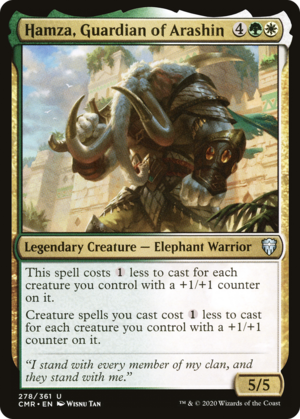
Card Details
Info
| Color: | |
| Identifies: | |
| Cost: |
|
| Rarity: | Uncommon |
| Converted Cost: | 6 |
| Power/Toughness: | 5/5 |
| Types: | |
| SubTypes: | |
| Languages: | 
        |
| Layout: | Normal |
| Rank: | |
| Saltiness: |
Rules
Prices
Legalities
Standard
Standardbrawl
Vintage
Modern
Brawl
Historic
Duel
Alchemy
Predh
Oathbreaker
Commander
Pioneer
Oldschool
Timeless
Premodern
Penny
Pauper
Gladiator
Paupercommander
Future
Legacy
Text
This spell costs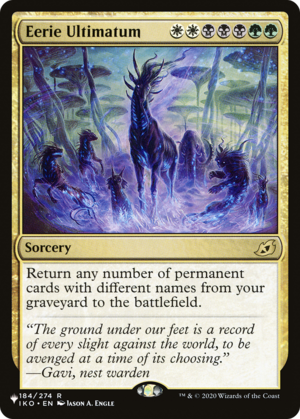
Card Details
Info
| Color: | |
| Identifies: | |
| Cost: |
|
| Rarity: | Rare |
| Converted Cost: | 7 |
| Power/Toughness: | / |
| Types: | |
| SubTypes: | |
| Languages: | 
          |
| Layout: | Normal |
| Rank: | |
| Saltiness: |
Rules
Text
Return any number of permanent cards with different names from your graveyard to the battlefield.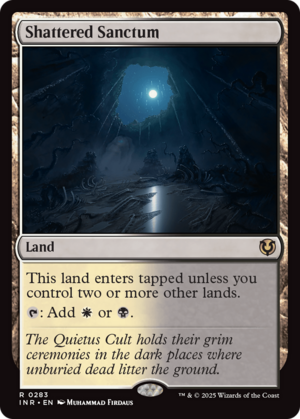
Card Details
Info
| Color: | |
| Identifies: | |
| Cost: | |
| Rarity: | Rare |
| Converted Cost: | 0 |
| Power/Toughness: | / |
| Types: | |
| SubTypes: | |
| Languages: | 
          |
| Layout: | Normal |
| Rank: | |
| Saltiness: |
Rules
Prices
Legalities
Standard
Standardbrawl
Vintage
Modern
Brawl
Historic
Duel
Alchemy
Predh
Oathbreaker
Commander
Pioneer
Oldschool
Timeless
Premodern
Penny
Pauper
Gladiator
Paupercommander
Future
Legacy
Text
This land enters tapped unless you control two or more other lands.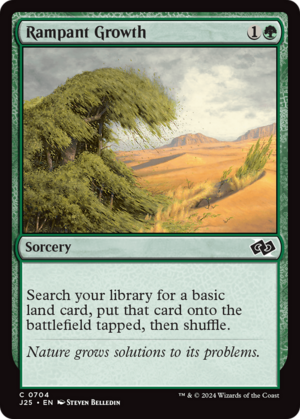
Card Details
Info
| Color: | |
| Identifies: | |
| Cost: |
|
| Rarity: | Common |
| Converted Cost: | 2 |
| Power/Toughness: | / |
| Types: | |
| SubTypes: | |
| Languages: | 
          |
| Layout: | Normal |
| Rank: | |
| Saltiness: |
Rules
Text
Search your library for a basic land card, put that card onto the battlefield tapped, thenshuffle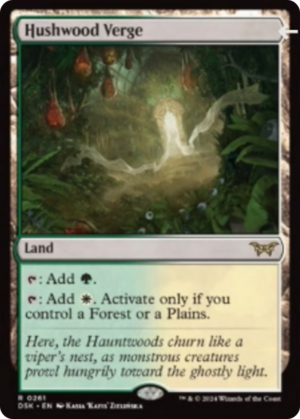
Card Details
Info
| Color: | |
| Identifies: | |
| Cost: | |
| Rarity: | Rare |
| Converted Cost: | 0 |
| Power/Toughness: | / |
| Types: | |
| SubTypes: | |
| Languages: | 
     |
| Layout: | Normal |
| Rank: | |
| Saltiness: |
Rules
Prices
Legalities
Standard
Standardbrawl
Vintage
Modern
Brawl
Historic
Duel
Alchemy
Predh
Oathbreaker
Commander
Pioneer
Oldschool
Timeless
Premodern
Penny
Pauper
Gladiator
Paupercommander
Future
Legacy
Text
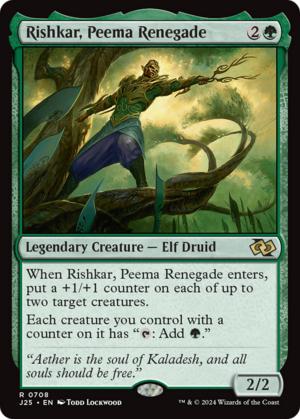
Card Details
Info
| Color: | |
| Identifies: | |
| Cost: |
|
| Rarity: | Rare |
| Converted Cost: | 3 |
| Power/Toughness: | 2/2 |
| Types: | |
| SubTypes: | |
| Languages: | 
          |
| Layout: | Normal |
| Rank: | |
| Saltiness: |
Rules
Text
When Rishkar enters, put a +1/+1counteron each of up to two target creatures. Each creature you control with acounteron it has "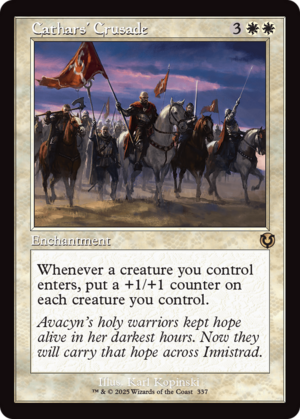
Card Details
Info
| Color: | |
| Identifies: | |
| Cost: |
|
| Rarity: | Rare |
| Converted Cost: | 5 |
| Power/Toughness: | / |
| Types: | |
| SubTypes: | |
| Languages: | 
          |
| Layout: | Normal |
| Rank: | |
| Saltiness: |
Rules
Prices
Legalities
Standard
Standardbrawl
Vintage
Modern
Brawl
Historic
Duel
Alchemy
Predh
Oathbreaker
Commander
Pioneer
Oldschool
Timeless
Premodern
Penny
Pauper
Gladiator
Paupercommander
Future
Legacy
Text
Whenever a creature you control enters, put a +1/+1counteron each creature you control.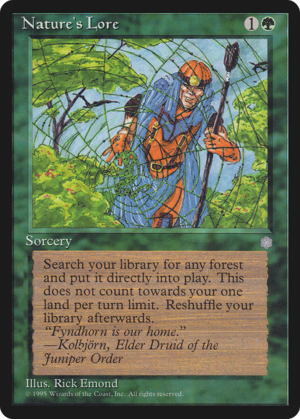
Card Details
Info
| Color: | |
| Identifies: | |
| Cost: |
|
| Rarity: | Uncommon |
| Converted Cost: | 2 |
| Power/Toughness: | / |
| Types: | |
| SubTypes: | |
| Languages: | 
          |
| Layout: | Normal |
| Rank: | |
| Saltiness: |
Rules
Text
Search your library for a Forest card, put that card onto the battlefield, thenshuffle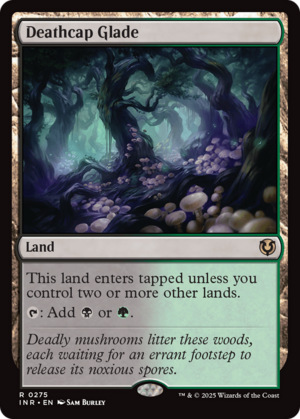
Card Details
Info
| Color: | |
| Identifies: | |
| Cost: | |
| Rarity: | Rare |
| Converted Cost: | 0 |
| Power/Toughness: | / |
| Types: | |
| SubTypes: | |
| Languages: | 
          |
| Layout: | Normal |
| Rank: | |
| Saltiness: |
Rules
Prices
Legalities
Standard
Standardbrawl
Vintage
Modern
Brawl
Historic
Duel
Alchemy
Predh
Oathbreaker
Commander
Pioneer
Oldschool
Timeless
Premodern
Penny
Pauper
Gladiator
Paupercommander
Future
Legacy
Text
This land enters tapped unless you control two or more other lands.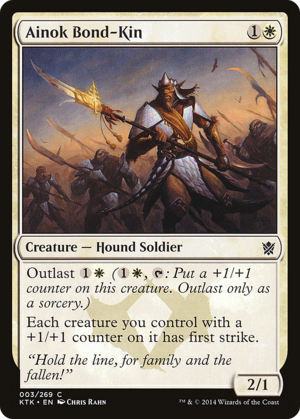
Card Details
Info
| Color: | |
| Identifies: | |
| Cost: |
|
| Rarity: | Common |
| Converted Cost: | 2 |
| Power/Toughness: | 2/1 |
| Types: | |
| SubTypes: | |
| Languages: | 
          |
| Layout: | Normal |
| Rank: | |
| Saltiness: |
Abilities/Keywords
Rules
Prices
Legalities
Standard
Standardbrawl
Vintage
Modern
Brawl
Historic
Duel
Alchemy
Predh
Oathbreaker
Commander
Pioneer
Oldschool
Timeless
Premodern
Penny
Pauper
Gladiator
Paupercommander
Future
Legacy
Text
Outlast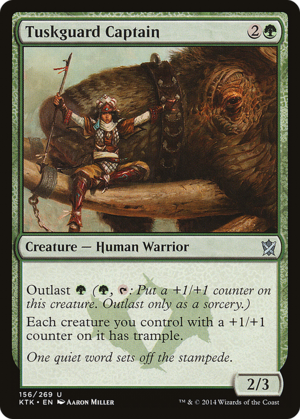
Card Details
Info
| Color: | |
| Identifies: | |
| Cost: |
|
| Rarity: | Uncommon |
| Converted Cost: | 3 |
| Power/Toughness: | 2/3 |
| Types: | |
| SubTypes: | |
| Languages: | 
          |
| Layout: | Normal |
| Rank: | |
| Saltiness: |
Abilities/Keywords
Rules
Prices
Legalities
Standard
Standardbrawl
Vintage
Modern
Brawl
Historic
Duel
Alchemy
Predh
Oathbreaker
Commander
Pioneer
Oldschool
Timeless
Premodern
Penny
Pauper
Gladiator
Paupercommander
Future
Legacy
Text
Outlast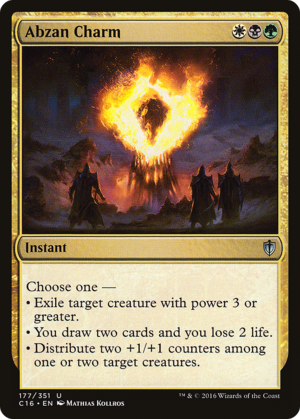
Card Details
Info
| Color: | |
| Identifies: | |
| Cost: |
|
| Rarity: | Uncommon |
| Converted Cost: | 3 |
| Power/Toughness: | / |
| Types: | |
| SubTypes: | |
| Languages: | 
          |
| Layout: | Normal |
| Rank: | |
| Saltiness: |
Rules
Text
Choose one — • Exile target creature with power 3 or greater. • You draw two cards and you lose 2 life. • Distribute two +1/+1 counters among one or two target creatures.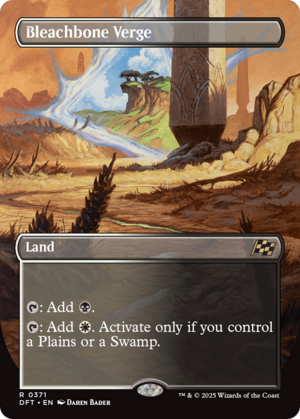
Card Details
Info
| Color: | |
| Identifies: | |
| Cost: | |
| Rarity: | Rare |
| Converted Cost: | 0 |
| Power/Toughness: | / |
| Types: | |
| SubTypes: | |
| Languages: | 
     |
| Layout: | Normal |
| Rank: | |
| Saltiness: |
Rules
Prices
Legalities
Standard
Standardbrawl
Vintage
Modern
Brawl
Historic
Duel
Alchemy
Predh
Oathbreaker
Commander
Pioneer
Oldschool
Timeless
Premodern
Penny
Pauper
Gladiator
Paupercommander
Future
Legacy